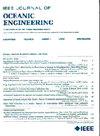一种用于摆波能量转换器的集成活塞-可变数字控制液压缸
IF 5.3
2区 工程技术
Q1 ENGINEERING, CIVIL
引用次数: 0
摘要
摆式波能转换器是一种重要的波能收集装置。为了在更宽的波动条件下获得更好的性能,本文提出了一种集成活塞-可变数字控制液压缸(IPDC)。传统上使用的单个大气缸被几对附属气缸取代,组成一个更紧凑和可扩展的集成类型。利用高速开关阀可以实时调节IPDC的工作区域,以改变功率输出(PTO)阻尼,并在摆式WEC中实现最大的能量提取。在性能试验中,各区域组合的平均机械效率在95%左右,泄漏量相对较低。结果表明,与传统的单液压缸相比,IPDC具有更低的额外能量损失。在对最大功率提取进行理论分析的基础上,通过AMESim-Simulink联合仿真和样机实验验证了IPDC的可行性和有效性。实验表明,与固定面积圆柱体相比,IPDC可显著提高总捕获能量37.04%。结果表明,在宽波条件下,IPDC通过有效改变连接面积来施加兼容的PTO电阻,表现出优异的收集性能。本文章由计算机程序翻译,如有差异,请以英文原文为准。
An Integrated Piston-Variable Digital-Controlled Hydraulic Cylinder for Pendulum Wave Energy Converter
A pendulum wave energy converter (WEC) is one of the most important forms of wave energy harvesting devices. To obtain better performance under broader wave conditions, this article proposes an integrated piston-variable digital-controlled hydraulic cylinder (IPDC). A traditionally used single large cylinder is replaced by several pairs of subsidiary cylinders to compose a more compact and extendable integrated type. The working area of the IPDC can be regulated in real time using high-speed on–off valves to change power take-off (PTO) damping and achieve maximum energy extraction in the pendulum WEC. In performance experiments, the average mechanical efficiency is around 95% for all area combinations, and the leakage is relatively lower. The results indicate that the IPDC has a lower extra energy loss compared with a conventional single hydraulic cylinder. Based on the theoretical analysis for maximum power extraction, AMESim–Simulink co-simulation and prototype experiments are conducted to verify the feasibility and effectiveness of the IPDC. The IPDC can significantly improve the total captured energy by 37.04% compared with the fixed area cylinder in the experiment. The results illustrate that the IPDC exhibits excellent harvesting performance by effectively changing the connected area to impose compatible PTO resistance under broader wave conditions.
求助全文
通过发布文献求助,成功后即可免费获取论文全文。
去求助
来源期刊

IEEE Journal of Oceanic Engineering
工程技术-工程:大洋
CiteScore
9.60
自引率
12.20%
发文量
86
审稿时长
12 months
期刊介绍:
The IEEE Journal of Oceanic Engineering (ISSN 0364-9059) is the online-only quarterly publication of the IEEE Oceanic Engineering Society (IEEE OES). The scope of the Journal is the field of interest of the IEEE OES, which encompasses all aspects of science, engineering, and technology that address research, development, and operations pertaining to all bodies of water. This includes the creation of new capabilities and technologies from concept design through prototypes, testing, and operational systems to sense, explore, understand, develop, use, and responsibly manage natural resources.
 求助内容:
求助内容: 应助结果提醒方式:
应助结果提醒方式:


